
LMU has long been ahead of the curve when it comes to environmental sustainability, from LEED-qualified buildings, solar panels atop University Hall, and our on-site recycling facility. But what about inside the classroom?
Junior Bree Aguinaldo wondered about that, and about how other LMU students viewed issues related to sustainability. So the biology major set about creating a statistical portrait of those attitudes by surveying a group of her peers.
“Most of the students are involved in sustainability service, whether they realize it or not. They’re inclined to want to do their part but they need the knowledge to help them do it,” Aguinaldo said.
Aguinaldo’s survey found that 75 percent of respondents thought adding a sustainable class pertaining to their major might be beneficial, though 60 percent of them did not see a career in environmentalism. Rather than a discrepancy, Aguinaldo sees a positive in this result: students are foreseeing the application of environmental sustainability in a variety of fields.
“There are real benefits to business or education majors because they will be the ones who will start eco-friendly business and teach sustainability in the classroom,” Aguinaldo said. “These kinds of activities will change society.”
Aguinaldo presented her results at the annual Undergraduate Research Symposium, a one-day event where undergraduates can showcase their research and creative works. Topics this year covered a vast range, from the respiration of Beluga whales to the overthrow of the Hawaiian monarchy. The event included panel discussions, presentations on study abroad and internship experiences, and live musical performances and art displays.
“The symposium was a good chance to see how important research can be,” said Aguinaldo, who is also working toward a minor in sociology. “After speaking a lot about my research and seeing how excited I got, I realized how into the topic I really was. I felt unique and like I’ve actually done something concrete at LMU.”
Aguinaldo first became interested in the topic after taking an environmental sociology course taught by Eric Strauss, urban ecology professor and President’s Professor of biology, who also mentored her while she conducted her research.
“In the next 10 to 15 years, everyone will need an environmentalist,” Aguinaldo said. “Right now, few people stand up for the environment and no one cares until it’s too late. We must start thinking about the long-term consequences of this kind of abuse.”



